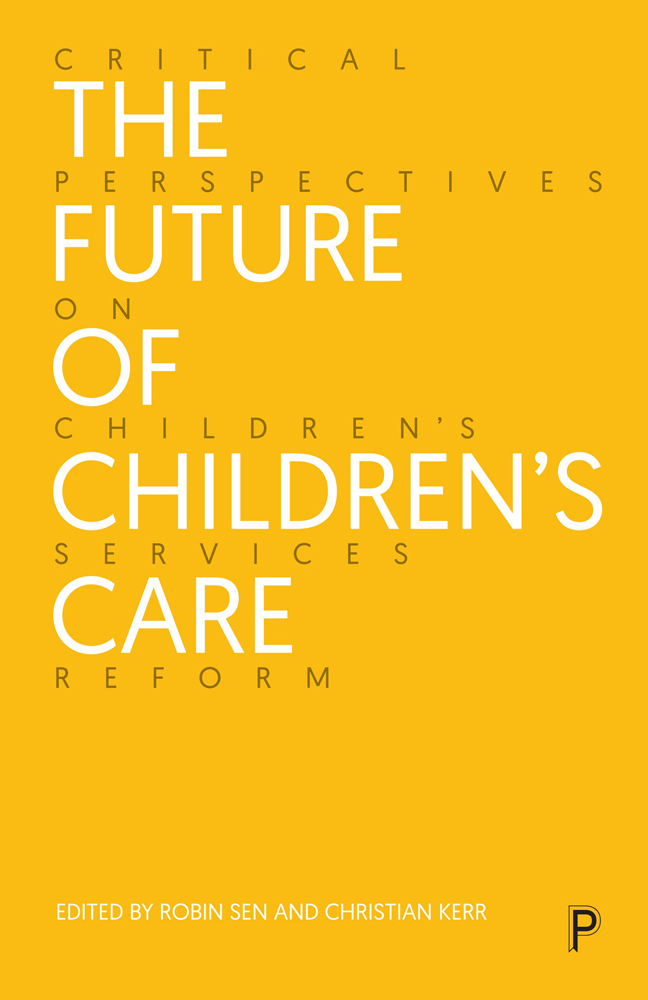Book contents
- Frontmatter
- Dedication
- Contents
- Notes on contributors
- Acknowledgements
- Foreword
- 1 Introduction: critical perspectives on children’s services reform
- 2 Where now? Children's rights in England into the 2020s
- 3 More of memes than schemes: networked propagation in children's social care
- 4 Reclaiming social work, the social work complex and issues of bias in children's services
- 5 Humane social work practice: a more parent friendly system? Hopes and challenges in the 2020s
- 6 Exploring and re-imagining children's services in England through a decolonial frame
- 7 Kinship care for England and Wales in the 2020s: assumptions, challenges and opportunities
- 8 If adoption is the answer, what was the question?
- 9 Caring for children and young people in state care in the 2020s
- 10 Protecting children: a social model for the 2020s
- 11 Conclusion: children's services reform looking back and forwards
- Index
7 - Kinship care for England and Wales in the 2020s: assumptions, challenges and opportunities
Published online by Cambridge University Press: 23 January 2024
- Frontmatter
- Dedication
- Contents
- Notes on contributors
- Acknowledgements
- Foreword
- 1 Introduction: critical perspectives on children’s services reform
- 2 Where now? Children's rights in England into the 2020s
- 3 More of memes than schemes: networked propagation in children's social care
- 4 Reclaiming social work, the social work complex and issues of bias in children's services
- 5 Humane social work practice: a more parent friendly system? Hopes and challenges in the 2020s
- 6 Exploring and re-imagining children's services in England through a decolonial frame
- 7 Kinship care for England and Wales in the 2020s: assumptions, challenges and opportunities
- 8 If adoption is the answer, what was the question?
- 9 Caring for children and young people in state care in the 2020s
- 10 Protecting children: a social model for the 2020s
- 11 Conclusion: children's services reform looking back and forwards
- Index
Summary
Introduction
Kinship care is when children remain within their family constellation if they cannot remain with their primary carers, usually birth parents. In high-income countries, it is typically classified into two types of care – formal and informal (Hallett et al, 2021). Formal kinship care involves social work intervention, and children are usually cared for in statutory foster placements within the child's birth family constellation. Informal kinship care, which makes up around 95 per cent of UK kinship care arrangements, is where there is no statutory involvement, and the private family arrangement is not typically known to social services (Nandy et al, 2011).
In England and Wales, these classifications can become muddled. For example, although a child under a Special Guardianship Order (SGO) or a Child Arrangement Order (COA) may not formally be in the ‘care system’, some families may still have social work intervention as part of a court-ordered care plan. This can lead such arrangements to be described in regulations as formal (MacDonald et al, 2018). This messiness concerning definitions will be returned to later in the chapter.
Kinship care is a concept and a practice that can be attractive to various political persuasions and ideologies. Kinship care not only satisfies the aim of keeping families together as much as possible but is also a cost-effective strategy for cash-strapped local authorities (McGhee et al, 2018). These two significant benefits of kinship care can lead politicians, policy makers and large reviews of children's social care to make promises to grow kinship care. Indeed, a recommendation from the section ‘Unlocking the potential of family networks’ from the MacAlister Review (2022) is: ‘Recommendation: A Family Network Plan should be introduced and enabled in law to support and give oversight to family-led alternatives to care’ (MacAlister, 2022, p 103). The reasons given for this are that ‘[d] elivering this recommendation should provide better outcomes for children. It would also be less expensive than providing foster or residential care’ (MacAlister, 2022, p 103). Increasing the use of kinship care is seen as a common-sense solution to reduce costs, improve outcomes for children, and allow the continuation of care by the community and family members for children who are past care-leaving age. However, such assumptions are made by drawing unsubstantiated conclusions on unresolved debates regarding kinship care.
- Type
- Chapter
- Information
- The Future of Children's CareCritical Perspectives on Children's Services Reform, pp. 122 - 144Publisher: Bristol University PressPrint publication year: 2023



